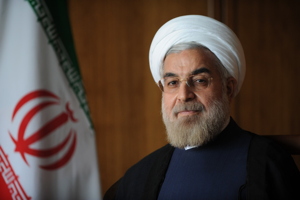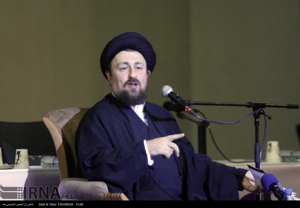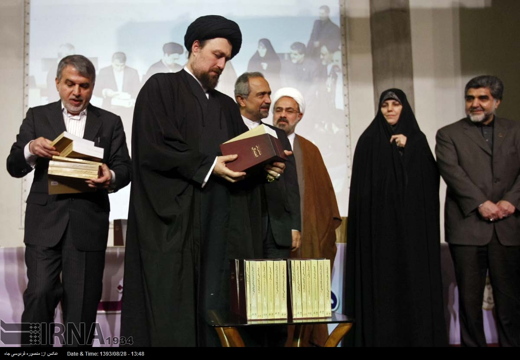The National Moderation Conference opened in the National Library of Iran in Tehran on November 19. The Islamic Republic News agency (IRNA) and the Iranian Student News Agency (ISNA) posted two separate reports about the conference which started off with a message from President Rouhani followed by a keynote address by Seyyed Hassan Khomeini, the grandson of the late Imam Khomeini. What appears below is a partial translation of the reports the two news agencies carried:
President Rouhani’s Message

No approach is more transparent than moderation, in theory and in practice alike, when it comes to efforts to minimize the intertwined risks of extremism in thinking, words and deeds.
The onus is on thinkers, scientists and researchers to explain the principles and concepts of social, cultural and political moderation in such meetings, and clear the way for policymakers, executive officials and the public to promote and institutionalize the culture of moderation.
Moderation is naturally linked with wisdom- and science-based, all-inclusive activities about which university scholars are better-positioned to talk. When politics, which is expected to administer justice and support spirituality and human solidarity, turns into efforts to grab power, it will be very much disposed toward extremism. In today’s world, this phenomenon has degenerated into an existential threat in the [Middle East] region. So the responsibility lies with scholars to maximize the social and political potential of moderation.
Moderation in governance signals the following message: it is far from possible to run a country with diverse tastes in the absence of science, dialogue and tolerance. That’s why we have always urged those who are interested in the country and the Islamic revolution to deal with different questions in a tolerant way. We should let people speak their mind; we should not marginalize big figures for small blunders.
Moderation in politics calls for heeding people’s vote and making office holders work within the framework of sagacity, integrity and ethics and stay clear of arrogance and self-centeredness.
In science, moderation translates into a link between scientific and theoretical foundations and experiences gained from society’s social and political life. Therefore, it would be justifiable if we expect scientists and scholars to analytically and critically study the correlation between the concept of moderation and public demands and the Iranian-Islamic culture, and to unlock the potential to provide what is needed for comprehensive, sustainable development.
Generally, moderation is inseparable from constructive political activism. Particularly, it is inevitable for an exit strategy from the current conflicts and extremist acts in domestic and international policies. No doubt, university scholars should thoroughly think through the idea of moderation in order to open up its layers.
Although moderation is, by definition, keeping distance from going to extremes, this fails to define an important concept which is to lead the government’s all-out efforts as well as the nation’s progress and development. I think moderation can entail all the following:
Developing a new insight into Iran’s modernity
Introducing sustainable economic development as something which comes with individual, collective and regional justice
Striking a balance between idealism and realism
Establishing constructive interaction with the world
Identifying the historic limitations and possibilities of a nation
Focusing on science-based activities and respecting science
Recognizing plurality
Striking a balance in measures to exploit the environment
Striking a balance between the government’s power and society
And, setting out on a balanced march toward all-out development.
What is of vital importance here is that we try to wipe violent and extremist acts from the compassionate face of Islam.
Seyyed Hassan Khomeini’s speech

Moderation promotes national unity and a moderate society won’t grapple with disunity.
Forgiveness is one of the missing links of our society. We should let bygones be bygones. One of the pillars of a moderate society is the presence of forgiveness whereas an extremist society gives rise to spite.
The absence of moderation might result in infamy for a religion. At the moment, what ISIL has done has taken a heavy toll on religion. If we have faith in religion, we should adorn the religion [with virtues]. If we are really concerned about our religion or country, we need to refrain from going to extremes.
Moderation can be practiced through dialog in which no one should think of themselves as superior to the other side, nor should they seek to impose their ideas on others. No one should regard themselves as the absolute right.
In a dialog, it is possible to like someone and disagree with them at the same time. In a dispute there is a presumption that the other side is wrong, while a dialog does not entail such a premise. Throughout a dialog, efforts are made to explore the truth.
